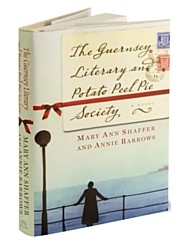Readers' Guide: The Guernsey Literary and Potato Peel Pie Society by Mary Ann Shaffer & Annie Barrows
The Guernsey Literary and Potato Peel Pie Society

Category: FICTION
Guide Created By: JoanP
Discussion Leader(s): JoanP & Pedln
Read our archived discussion of this book
Study Questions
2. What was it about Charles Lamb that attracted Dawsey Adams to his work?
3. What part did Elizabeth McKenna play in the creation of the literary society?
4. Why does Mrs. Maugery hesitate to have the Society participate in Juliet's article on the society for the Times? What do you think finally convinced her to approve of the interviews?
5. What do their reading choices reveal about the personalities of the members of the Society? What do your own choices reveal about you?
6. What did you learn about the German occupation of Guernsey in these pages? How do you think the Islanders managed to survive the occupaton for five years?
7. "Reading good books ruins you for enjoying bad ones." Do you agree with Isola? Will you share your favorite references to books and reading in these pages?
8. What did you find especially meaningful in this first section; what surprised you, riled you, or tickled your fancy?
1. How do you envision the Literary Society meetings now that we are hearing from more members? How has the Literary Society grown from the original six? Which members do you find interesting?
2. Is there a deeper meaning to the various characters' choices or did the Shaffer randomly choose the authors referred to in the book? (Jude)
3. "I did not want to spend my time reading about people who never was, doing things they never did." (Clovis Fossey) Do you know people who feel this way about fiction? How did the busy farmer become interested in poetry? When was the last time you memorized a poem?
4. Why is Adelaide Addison so intent on putting an end to Juliet's correspondance with the literary society especially now that Elizabeth McKenna is no longer on the island?
5. How is Juliet's correspondance with the Guernsey Literary Society affecting her relationship with Mark? Do you sense that Sidney is more than just a big brother friend? (Who is Piers?)
6. Why would the Islander girls and Dawsey Adams fraternize with German soldiers? How do they communicate? What did they have in common?
7. To whom does the Jewish John Booker owe his survival during the occupation? What drew him to the the letters of Seneca?
8. What gruesome information does Juliet's research reveal about events and conditions on the islands during the occupation? Why does she decide she must go to Guernsey?
9. Will you share your underlining, your notes on this week's letters; what surprised you, riled you, or tickled your fancy?
1. How had the Islanders adapted to the presence of the volatile German soldiers, sometimes friendly, sometimes brutal? Can the Occupation soldiers be trusted? Ever?
2. What do you think of the Guernsey girls who took favors from the Germans and turned in John Booker for a new lipstick? Can you see Elizabeth McKenna falling in love with one of the them?
3. Is Elizabeth MeKenna a believable character to you? Do you have a favorite "Elizabeth" anecdote?
4. What did you think of Mark's reasons for believing he and Juliet are right for one another? Is it significant that she tells him not to come to Guernsey, but is delighted that Sidney is coming?
5. Why does Juliet think Dawsey looks like Charles Lamb? Do you see him as a possible "swain" for Juliet?
6. Can Isola slip an elixir into Sidney's coffee powerful enough to overcome the obstacle between him and Juliet? From Bronte to Austen in one cozy weekend with Sidney?
7. Is the name of the "Dead Bride" game whichJuliet and Kit are playing significant to you?
8. What shocking news does Remy Girard's letter convey to the members of the literary society?
9. Can you share the episodes that made you smile during this tragic period?
1. What did you think of this novel made up entirely of letters as a means of telling a story? Did it work for you? Did the characters come alive through this means of expression?
2. What historical facts concerning World War II did you discover? Can fiction sometimes make historic events more understandable or does it distort the facts?
3. Do you believe that books have the power to lift people out of the most trying circumstances?
4. Juliet sees Dawsey Adams as Charles Lamb. Did she ever see him as Jane Austen's Mr. Rochester or Mr.Darcy? Are these men at all alike? How was Dawsey different from other men Juliet had known?
5. What effect did Remy Girard's arrival on the scene after the war have on the members of the literary society? What was Juliet's reaction to her coming? Why did Remy decide to leave?
6. Why do you think Isola's grandmother's letters from Oscar Wilde about cats were included in this story?
7. When did you first suspect that Juliet and Dawsey might become romantically involved? What part did Isola play in making the match?
8. Why do you think the authors decided to end the book with Isola's "Detection Notes"? Did they add an element to the story that could not have been achieved in letters?
9. What does a reader's taste in books say about his or her personality?
Which characters' literary opinions are most like your own? Did you have a favorite?
10. Do you agree with Isola that "reading good books ruins you for enjoying bad one"? Are there some "good books" you intend to read as a result of this book discussion?
Related Links
Author's Biography | Visit Guernsey | A history of Guernsey during the German Occupation 1940 - 1941 | Charles Lamb - Selected Essays | Letters of Seneca | Guernsey Potato Peel Pie Recipe